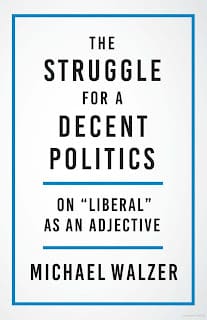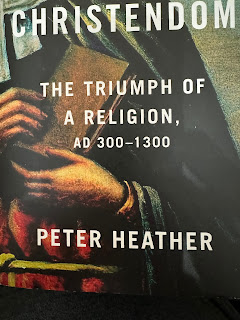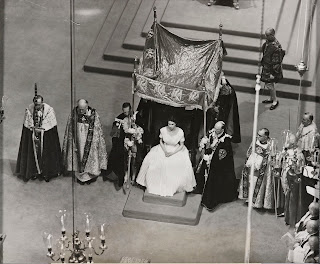Michael Walzer, the author of some 27 books and 300 articles, is a political theorist and professor emeritus at Princeton’s Institute for Advanced Study, previously of Harvard, and emeritus editor of Dissent. His latest book is The Struggle for a Decent Politics: On « Liberal » as an Adjective (Yale U. Pr., 2023). (Full disclosure: some 50 or so years ago, Walzer descended from the heights of Harvard to teach a graduate seminar on Thomas Hobbes at Princeton. I was a participant in that wonderful seminar. I doubt I made any impression on Walzer, but he made a memorable impression on me.)
Written during the pandemic, while Walzer was a home locked out of his office, this is admittedly not some seriously footnoted, academic work of political theory. It is « an argument about politics – about the best kind of politics. It’s not quite a program, more like a hope. » The fact that The Struggle for a Decent Politics is not written in the form of an academic work contributes to two of the book’s greatest virtues. It is eminently personal – perhaps Walker’s most personal book. It is also inclusive in regard to a wide range of issues that Walzer personally cares about, that he thinks other should care about, and contemporary political theory most definitely needs to care about.
The two adjectives in the title are the key to the book. This is about achieving a « decent » politics – not a perfect politics, or an ideal politics, or a utopia, or a pure implementation of an ideology. The inherent modesty of the goal is inherent to an appreciation of the other adjective, « liberal, » which (while not utterly devoid of substance) is more about an attitude, a set of pre-political moral or ethical or attitudinal commitments than a vision of the good life. Indeed, I would say that it is of the very nature of modernity that it has made any common vision of the good life, any collective pursuit of the good life, practically impossible. Much as Saint Augustine first affirmed a totalistic definition of justice and then shifted ground and invoked a realistic, achievable, practical relative kind of justice, I think Walzer’s « liberal » adjective is a descriptor for an analogous, secular, very relative justice.
Walzer applies the adjective as a modifier and qualifier to several nouns to political ideologies and identities he considers of contemporary relevance. They happen, of course to be ideologies and identities he has been personally and/or professionally engaged with over the course of his life and career. So he attempts to describe, in turn, what we might call the moral or ethical attitudes off liberal Democrats, liberal Socialists, liberal Nationalists and Internationalists, liberal Communitarians, liberal Professors and Intellectuals, and liberal Jews.
He starts from the liberal constraints early modernity imposed on politics as « a kind of disaster avoidance for everyone involved. » That important (life-and-death kind of important) but modest attitude about politics makes for what we also call civility. In the process, he addresses all sorts of practical, contemporary, « hot-button » issues. The hottest button, in view of the current legal problems of a certain former president is Walzer’s sensible assertion that « ‘Lock him up’ is not a chant for liberal democrats during or after an election. It is better to say, even in the case of a Donald Trump: ‘This is not what we do’. » Walzer also expresses « a touch of skepticism about civil liberties absolutism, » a high valuation citizenship, including « civil religion, » the importance of citizens’ « sense of efficacy » (which he believes « angry, resentful, dysfunctional » Capitol rioters lacked, in part because of « a not unreasonable belief that the country’s rulers had given up on them »), and the importance of « enhanced education » in what he calls « critical empiricism. »
When looking at liberal socialism, he obviously favors liberal « constraint and accountability » over « an undemocratic dictatorship of the vanguard of the proletariat. » In terms of contemporary issues, he recognizes that « affirmative action doesn’t change the hierarchical character of capitalist society; it just moves some people into higher positions. » And he insists on « a strong and democratically accountable state » as « the most likely agent for democratic engagement. »
Liberal nationalism he considers « the oldest form of nationalism, » tracing it back to the 19th-century Italian Risorgimento. He prefers that to « cosmopolitans, » whose opposition to nationalism is inevitably also hostility to democracy, and who prefer men and women, as they believe they should be, to actually existing people. He identifies cosmopolitanism with Kant’s « soulless despotism. » Importantly, he points out that Democratic socialists have only been successful in democratic national states. (Perhaps somewhat inconsistently – although obviously he doesn’t see it that way – Walzer opposed Brexit and « marched with friends in London in support of remaining in the European Union. » Obviously, he doesn’t see the EU as a « soulless despotism, » but many democracy advocates in Britain did. All of which just illustrates how, all theorizing aside, all of us have our particular class consciousness and in-group biases.)
Regarding immigration, he recognizes « the value of particular obligations in the lives of individuals » and that « collectives, like nation-states, can also be obligated to some people more than to others. » He recognizes the uniqueness of the American case, where patriotism « has no ethnic content » and « doesn’t appeal to an ancient history. » Thus, much of what passes for contemporary U.S. nationalism « is less an ideology that sets us apart from foreigners than one that divides us at home. » What he calls « Trumpian nationalism, » in any case, « isn’t so much a nationalist as a populist politics. »
Tackling communitarianism, Walzer inevitably confronts the ghost of Rousseau’s communitarian civic republicanism and instead advocates for « a form of social life that falls short of communal intensity but is crucial to the decencies of everyday existence. »
On the more tricky terrain of feminism, he is against trying to enforce « Enlightenment ideals » abroad. He is, however, more open to requiring such adjustments on the part of immigrants. He would require teaching « civics and American history even in privately run religious schools committed to a different curriculum. » He is ambivalent about tax-exemptions for religious organizations that exclude women from top positions, recognizing that women are engaged in the « educational and charitable activities that the exemptions fund. » He is also sensitive to the problematic aspects of multiculturalism, which « is definitely bad for gays and lesbians, » and defends what he calls « a soft multiculturalism » which aims « at eliminating all forms of sexual subordination while leaving room for the politics of difference. » In practice, that may prove one of the tougher needles to thread.
Closer to his professional home, he wants to distinguish academic faculties from political organizations, and observes that « scholars who kowtow to the powers that be compromise or degrade their scholarship, whoever the powers are. » Walzer recognizes as « the right response, » the resentment and anger which « the casual racism of the old professoriate » produced in newly desegregated colleges and universities. « But somehow in our sentimentalizing culture, anger got changed into a plea for comfort: I’m offended; I’m insulted; my feelings are hurt. » Walzer advises students to « look to be respected, not consoled, » and says « sensitivities encouraged become ever more sensitive. » Of particular interest is his advocacy on behalf of the « academic proletariat » who have little or no chance of professional advancement.
In his chapter, « Liberal Jews, » Walzer strongly defends American « separationism, » which he distills to four practical principles. He repeats his endorsement of history and civics classes, which he calls the « first language » our political community as an established constitutional democracy. He recognizes the American cultural reality – that religious references work well in American political discourse – but wants to ensure that no one is excluded. He rejects any right to « refuse to serve people whose religious or secular practices » one does not approve of. But he believes illiberal religious people « can also live comfortably in a secular state even if they don’t help to sustain it. They have only to give up the commitment that everyone else must live as they do. » This, I think, highlights the relative character of Walzer’s proposals.
As an ideological as well as pragmatic liberal, Walzer wants « acceptance of difference as a good thing. » That is farther than I think one need go, and would certainly be problematic for some – especially religiously motivated people – to go. On the other hand, acceptance of difference as an inexorable fact of life in a fallen world (the only kind of earthly world we will ever live in) is in my judgment at the heart of what any « decent politics » must require. Walzer has reminded us that political life is contingent, a constant challenge of better or worse choices among irresolvable differences.
As a guide to how to implement such a decent politics (whether denominated as liberal or with some less historically and philosophically fraught term) Walzer’s work offers a soundly argued practical guidebook, however much many may disagree about particulars.





